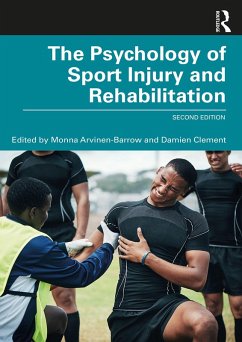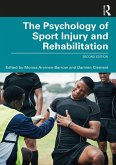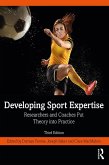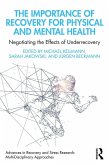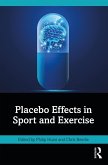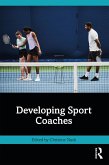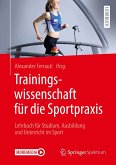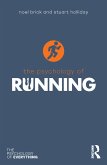The Psychology of Sport Injury and Rehabilitation (eBook, PDF)
Redaktion: Arvinen-Barrow, Monna; Clement, Damien
39,95 €
39,95 €
inkl. MwSt.
Sofort per Download lieferbar

20 °P sammeln
39,95 €
Als Download kaufen

39,95 €
inkl. MwSt.
Sofort per Download lieferbar

20 °P sammeln
Jetzt verschenken
Alle Infos zum eBook verschenken
39,95 €
inkl. MwSt.
Sofort per Download lieferbar
Alle Infos zum eBook verschenken

20 °P sammeln
The Psychology of Sport Injury and Rehabilitation (eBook, PDF)
Redaktion: Arvinen-Barrow, Monna; Clement, Damien
- Format: PDF
- Merkliste
- Auf die Merkliste
- Bewerten Bewerten
- Teilen
- Produkt teilen
- Produkterinnerung
- Produkterinnerung

Bitte loggen Sie sich zunächst in Ihr Kundenkonto ein oder registrieren Sie sich bei
bücher.de, um das eBook-Abo tolino select nutzen zu können.
Hier können Sie sich einloggen
Hier können Sie sich einloggen
Sie sind bereits eingeloggt. Klicken Sie auf 2. tolino select Abo, um fortzufahren.

Bitte loggen Sie sich zunächst in Ihr Kundenkonto ein oder registrieren Sie sich bei bücher.de, um das eBook-Abo tolino select nutzen zu können.
The Psychology of Sport Injury and Rehabilitation draws on the latest research in sport psychology and sports medicine. This new edition emphasizes the importance of a holistic, interprofessional approach to sport injury management and care.
- Geräte: PC
- mit Kopierschutz
- eBook Hilfe
Andere Kunden interessierten sich auch für
![The Psychology of Sport Injury and Rehabilitation (eBook, ePUB) The Psychology of Sport Injury and Rehabilitation (eBook, ePUB)]() The Psychology of Sport Injury and Rehabilitation (eBook, ePUB)39,95 €
The Psychology of Sport Injury and Rehabilitation (eBook, ePUB)39,95 €![Developing Sport Expertise (eBook, PDF) Developing Sport Expertise (eBook, PDF)]() Developing Sport Expertise (eBook, PDF)53,95 €
Developing Sport Expertise (eBook, PDF)53,95 €![The Importance of Recovery for Physical and Mental Health (eBook, PDF) The Importance of Recovery for Physical and Mental Health (eBook, PDF)]() The Importance of Recovery for Physical and Mental Health (eBook, PDF)43,95 €
The Importance of Recovery for Physical and Mental Health (eBook, PDF)43,95 €![Placebo Effects in Sport and Exercise (eBook, PDF) Placebo Effects in Sport and Exercise (eBook, PDF)]() Placebo Effects in Sport and Exercise (eBook, PDF)40,95 €
Placebo Effects in Sport and Exercise (eBook, PDF)40,95 €![Developing Sport Coaches (eBook, PDF) Developing Sport Coaches (eBook, PDF)]() Developing Sport Coaches (eBook, PDF)40,95 €
Developing Sport Coaches (eBook, PDF)40,95 €- -33%11
![Trainingswissenschaft für die Sportpraxis (eBook, PDF) Trainingswissenschaft für die Sportpraxis (eBook, PDF)]() Trainingswissenschaft für die Sportpraxis (eBook, PDF)42,99 €
Trainingswissenschaft für die Sportpraxis (eBook, PDF)42,99 € ![The Psychology of Running (eBook, PDF) The Psychology of Running (eBook, PDF)]() Noel BrickThe Psychology of Running (eBook, PDF)13,95 €
Noel BrickThe Psychology of Running (eBook, PDF)13,95 €-
-
-
The Psychology of Sport Injury and Rehabilitation draws on the latest research in sport psychology and sports medicine. This new edition emphasizes the importance of a holistic, interprofessional approach to sport injury management and care.
Dieser Download kann aus rechtlichen Gründen nur mit Rechnungsadresse in A, B, BG, CY, CZ, D, DK, EW, E, FIN, F, GR, HR, H, IRL, I, LT, L, LR, M, NL, PL, P, R, S, SLO, SK ausgeliefert werden.
Produktdetails
- Produktdetails
- Verlag: Taylor & Francis
- Seitenzahl: 348
- Erscheinungstermin: 22. Januar 2024
- Englisch
- ISBN-13: 9781000984989
- Artikelnr.: 69513689
- Verlag: Taylor & Francis
- Seitenzahl: 348
- Erscheinungstermin: 22. Januar 2024
- Englisch
- ISBN-13: 9781000984989
- Artikelnr.: 69513689
- Herstellerkennzeichnung Die Herstellerinformationen sind derzeit nicht verfügbar.
Monna Arvinen-Barrow is Associate Professor in the School of Rehabilitation Sciences and Technology at the University of Wisconsin-Milwaukee, USA; an online contributing faculty at the University of St. Augustine for Health Sciences, USA; and the Establishing Editor-in-Chief of the Journal for Advancing Sport Psychology in Research. She is a Chartered Psychologist (CPsychol) and an associate fellow (AFBPsS) of the British Psychological Society, a Certified Mental Performance Consultant (CMPC®), a fellow (FAASP) of the Association for Applied Sport Psychology, and a Certified Mental Performance Coach and Exercise Practitioner (UPV sert.) of the Finnish Psychological Association. Monna is the lead editor of two textbooks: The Psychology of Sport Injury and Rehabilitation (2013) and The Psychology of Sport and Performance Injury: An Interprofessional Case-Based Approach (2019). Damien Clement is Associate Dean of the Honors College and a professor of sport, exercise, and performance psychology at West Virginia University, USA. He is a certified athletic trainer, a national certified counsellor, and a Certified Mental Performance Consultant (CMPC®) and fellow (FAASP) of the Association for Applied Sport Psychology. In 2014, Damien was the recipient of the Dorothy V. Harris Award by the Association for Applied Sport Psychology for his distinguished contributions in the field of sport and exercise psychology as a scholar/practitioner. He is the co-editor of the 2019 book The Psychology of Sport and Performance Injury: An Interprofessional Case-Based Approach.
Part I: Biopsychosocial Approach to Sport Injury
1. Introduction to Sport Injury Psychology
2. Biopsychosocial Risk Factors of Sport Injury
3. Biopsychosocial Understanding of Sport Injury
4. Cultural, Institutional, and Relational Understanding of Sport Injury
5. Psychosocial Understanding of Sport-related Concussion
6. Psychosocial Understanding of Patellofemoral Pain
Part II: Professional Practice in Sport Injury and Rehabilitation
7. Professional Practice Models in Sport Injury and Rehabilitation
8. Ethical Issues in Sport Injury and Rehabilitation
9. Counselling Skills in Sport Injury and Rehabilitation
10. Psychosocial Assessment and Referral in Sport Injury and Rehabilitation
11. Multicultural Considerations in Sport Injury and Rehabilitation
Part III: Psychosocial Strategies in Sport Injury and Rehabilitation
12. Coping with Sport Injury and Rehabilitation
13. Patient Education in Sport Injury and Rehabilitation
14. Goal Setting in Sport Injury and Rehabilitation
15. Self-talk in Sport Injury and Rehabilitation
16. Relaxation Techniques in Sport Injury and Rehabilitation
17. Imagery in Sport Injury and Rehabilitation
18. Social Support in Sport Injury and Rehabilitation
Part IV: Return to Participation and Transition Out of Sport
19. Return to Sport Participation
20. Transition Out of Sport
21. From Present to Future: Calls for New Paths in Sport Injury Psychology
Research
1. Introduction to Sport Injury Psychology
2. Biopsychosocial Risk Factors of Sport Injury
3. Biopsychosocial Understanding of Sport Injury
4. Cultural, Institutional, and Relational Understanding of Sport Injury
5. Psychosocial Understanding of Sport-related Concussion
6. Psychosocial Understanding of Patellofemoral Pain
Part II: Professional Practice in Sport Injury and Rehabilitation
7. Professional Practice Models in Sport Injury and Rehabilitation
8. Ethical Issues in Sport Injury and Rehabilitation
9. Counselling Skills in Sport Injury and Rehabilitation
10. Psychosocial Assessment and Referral in Sport Injury and Rehabilitation
11. Multicultural Considerations in Sport Injury and Rehabilitation
Part III: Psychosocial Strategies in Sport Injury and Rehabilitation
12. Coping with Sport Injury and Rehabilitation
13. Patient Education in Sport Injury and Rehabilitation
14. Goal Setting in Sport Injury and Rehabilitation
15. Self-talk in Sport Injury and Rehabilitation
16. Relaxation Techniques in Sport Injury and Rehabilitation
17. Imagery in Sport Injury and Rehabilitation
18. Social Support in Sport Injury and Rehabilitation
Part IV: Return to Participation and Transition Out of Sport
19. Return to Sport Participation
20. Transition Out of Sport
21. From Present to Future: Calls for New Paths in Sport Injury Psychology
Research
Part I: Biopsychosocial Approach to Sport Injury
1. Introduction to Sport Injury Psychology
2. Biopsychosocial Risk Factors of Sport Injury
3. Biopsychosocial Understanding of Sport Injury
4. Cultural, Institutional, and Relational Understanding of Sport Injury
5. Psychosocial Understanding of Sport-related Concussion
6. Psychosocial Understanding of Patellofemoral Pain
Part II: Professional Practice in Sport Injury and Rehabilitation
7. Professional Practice Models in Sport Injury and Rehabilitation
8. Ethical Issues in Sport Injury and Rehabilitation
9. Counselling Skills in Sport Injury and Rehabilitation
10. Psychosocial Assessment and Referral in Sport Injury and Rehabilitation
11. Multicultural Considerations in Sport Injury and Rehabilitation
Part III: Psychosocial Strategies in Sport Injury and Rehabilitation
12. Coping with Sport Injury and Rehabilitation
13. Patient Education in Sport Injury and Rehabilitation
14. Goal Setting in Sport Injury and Rehabilitation
15. Self-talk in Sport Injury and Rehabilitation
16. Relaxation Techniques in Sport Injury and Rehabilitation
17. Imagery in Sport Injury and Rehabilitation
18. Social Support in Sport Injury and Rehabilitation
Part IV: Return to Participation and Transition Out of Sport
19. Return to Sport Participation
20. Transition Out of Sport
21. From Present to Future: Calls for New Paths in Sport Injury Psychology
Research
1. Introduction to Sport Injury Psychology
2. Biopsychosocial Risk Factors of Sport Injury
3. Biopsychosocial Understanding of Sport Injury
4. Cultural, Institutional, and Relational Understanding of Sport Injury
5. Psychosocial Understanding of Sport-related Concussion
6. Psychosocial Understanding of Patellofemoral Pain
Part II: Professional Practice in Sport Injury and Rehabilitation
7. Professional Practice Models in Sport Injury and Rehabilitation
8. Ethical Issues in Sport Injury and Rehabilitation
9. Counselling Skills in Sport Injury and Rehabilitation
10. Psychosocial Assessment and Referral in Sport Injury and Rehabilitation
11. Multicultural Considerations in Sport Injury and Rehabilitation
Part III: Psychosocial Strategies in Sport Injury and Rehabilitation
12. Coping with Sport Injury and Rehabilitation
13. Patient Education in Sport Injury and Rehabilitation
14. Goal Setting in Sport Injury and Rehabilitation
15. Self-talk in Sport Injury and Rehabilitation
16. Relaxation Techniques in Sport Injury and Rehabilitation
17. Imagery in Sport Injury and Rehabilitation
18. Social Support in Sport Injury and Rehabilitation
Part IV: Return to Participation and Transition Out of Sport
19. Return to Sport Participation
20. Transition Out of Sport
21. From Present to Future: Calls for New Paths in Sport Injury Psychology
Research
